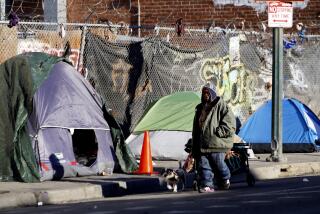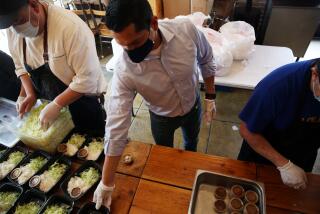Study Finds Widespread Poverty Among Elderly in Rural Kentucky Hills : Appalachia: Research discovers that 28.3% of those 65 and older endure financial hardship. But pride, and culture, discourages them from asking for help.
- Share via
MONTICELLO, Ky. — Thelma Spicer spends many summer hours on her porch. Air conditioning is among the many luxuries the 73-year-old rural homemaker and her husband cannot afford.
Sometimes at the end of the month, the only money they have comes from collecting aluminum cans from the side of the road.
“We pay our bills. We seem to do all right,” Spicer said. “There are times it gets tough. But we manage to get what we need and do manage to get by.”
The Spicers are among thousands of eastern Kentucky’s senior citizens who barely subsist on fixed incomes. A recent University of Kentucky study found that 28.3% of people 65 years and older in 49 counties in Appalachian Kentucky live in poverty.
Among other findings of the study by the university’s Sanders-Brown Center on Aging:
* In 19 of the counties, poverty rates among the elderly exceeded 34%. Eight counties record rates of more than 40%.
* For residents 75 and older, 17 counties had poverty rates of more than 40%. Five--Casey, Jackson, Monroe, Owsley and Russell--had rates of more than 50%. The Spicers live in Owsley County.
* In 15 counties, 40% of elderly women lived in poverty. In two counties, Wayne and Owsley, that figure was more than 50%.
“Employment opportunities for Appalachian women during the working lives of the current generation of elderly were extremely limited,” said Graham D. Rowles, a professor of geography and behavioral sciences who conducted the study.
So, like most women of their generation, he said, their economic status in retirement is determined primarily by their spouses’ earnings and pensions.
Dosha Blevins, 84, of Wayne County, survives on her deceased husband’s Army disability pension. “I worked, but I worked at home,” she said. “I try to stretch every dollar I can, but the bills keep going up. Water, garbage, everything is going up but my check.”
Spicer and her husband, Charlie, 86, survive on Social Security.
“I worked for 35 years. I did housework and I worked in restaurants and in nursing homes,” she said. “None of them paid a lot and my (Social Security) check isn’t very big, though . . . I worked hard.”
The so-called “Appalachian spirit” both contributes to, and shields residents from, poverty, researchers said.
Family and neighbors tend to support elderly people, including help with chores, home maintenance and transportation, the study found.
Spicer, a New York native whose sons live in northern Kentucky and Louisiana, and her husband count on her stepdaughter and her family, who live nearby. The stepdaughter’s family collects aluminum cans to supplement the families’ incomes.
“They help us a lot. But they are busy too,” Spicer said. “Everything is just so far away out here. You can’t walk to a senior citizens center like you can in the city. You just make do.”
Ruth Ann Miller is the aging specialist for the Kentucky River Area Development District, where half of the 16,691 rural elderly served are considered below the poverty level. Many times, she said, elderly residents and their children won’t ask her office for help until it’s a last resort.
“It’s the nature of eastern Kentucky,” she said. “It has been a tradition for families to take care of families, and we tend to hold on to traditions longer.”
When Blevins was sick recently, her sister’s daughter came and made breakfast for her and got her prescriptions filled. Her son took her to her doctor’s appointment. The church sent a bowl of vegetable soup for her supper. “Before I got that ate, they sent another,” she said.
Rowles said poverty shows up not only in income but also in the number of disadvantages people endure.
For example, 9% of elderly households in Appalachian Kentucky had no telephones in 1990, the study said. Almost one in three had no car.
Through senior citizens centers in each of the counties, poor elderly residents have access to transportation to doctors’ appointments or the grocery store, and to free meals. Residents can also have someone come to their homes and help with housework, home repairs and even personal care, such as baths.
But Cindy Wolford, aging specialist for the Lake Cumberland Area Development District, said people resist accepting help.
“They think people will look down on them if they come . . . for a meal or ask for help,” Wolford said. “Appalachian people are very proud. They’ve always done for themselves, and they don’t like asking for help from anybody.”
More to Read
Sign up for Essential California
The most important California stories and recommendations in your inbox every morning.
You may occasionally receive promotional content from the Los Angeles Times.













